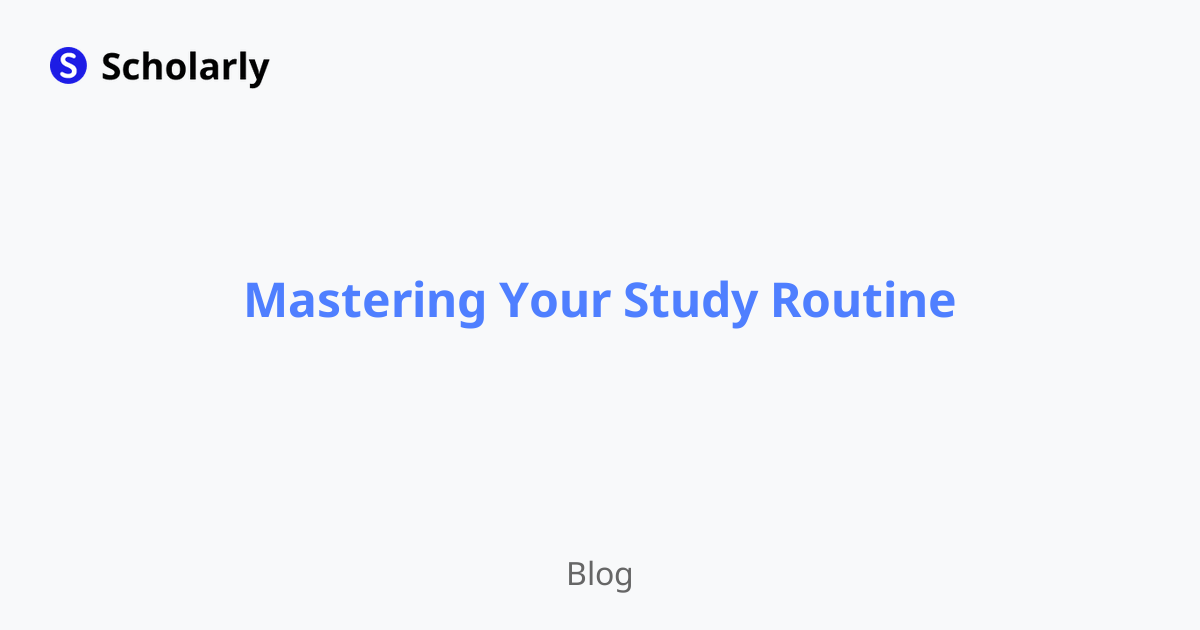Mastering Your Study Routine
Discover the key strategies and techniques for creating a study routine that will boost your productivity and help you achieve academic success.

Introduction
In today's fast-paced and demanding world, having an effective study routine is essential for students looking to achieve academic success. A study routine helps you stay organized, manage your time effectively, and maximize your learning potential. In this blog post, we will explore the key strategies and techniques that can help you master your study routine and enhance your learning experience.
The Importance of a Study Routine
Having a study routine provides numerous benefits that can greatly impact your academic performance. Here are some key reasons why a study routine is important:
Improved Time Management: A study routine helps you allocate dedicated time for studying, ensuring that you make the most of your available time and avoid procrastination.
Enhanced Productivity: By following a structured study routine, you can optimize your productivity and focus, allowing you to accomplish more in less time.
Consistency and Discipline: A study routine instills discipline and consistency in your learning process, which are crucial for long-term success.
Reduced Stress: A well-planned study routine can help reduce stress and anxiety by providing a clear roadmap for your studies.
Better Retention and Understanding: Following a study routine promotes active learning and helps you retain information better, leading to improved understanding and knowledge acquisition.
Improved Performance: A study routine helps you consistently review and reinforce your knowledge, leading to better performance in exams and assignments.
Designing Your Study Routine
Creating an effective study routine requires careful planning and consideration. Here are some steps to help you design your study routine:
Set Clear Goals: Start by setting clear, specific goals for your study sessions. Identify what you want to achieve and break down your goals into smaller, manageable tasks.
Establish a Schedule: Determine the best time of the day for your study sessions based on your individual preferences and energy levels. Create a schedule that allows for regular breaks and incorporates all your commitments.
Prioritize Tasks: Prioritize your tasks based on their importance and deadlines. Allocate more time for challenging subjects or topics that require additional practice.
Remove Distractions: Minimize distractions during your study sessions by turning off notifications on your phone, using website blockers, or finding a quiet study environment.
Create a Study Environment: Designate a specific space for studying, free from distractions and comfortable for long study sessions. Keep all necessary materials and resources within reach.
Break Down Study Sessions: Divide your study sessions into smaller, focused segments to maintain your concentration and prevent burnout. Use techniques like the Pomodoro Technique to work in intervals.
Review and Reflect: Regularly review and reflect on your study routine to identify areas for improvement. Make adjustments as needed to optimize your learning experience.
Strategies for Effective Learning
Once you have established your study routine, it is essential to incorporate effective learning strategies to maximize your academic achievements. Here are some strategies to help you learn more effectively:
Active Learning: Engage actively with the material by asking questions, summarizing key points, and discussing concepts with others. This promotes deeper understanding and better retention.
Chunking: Break down complex information into smaller, more manageable chunks. This helps your brain process and retain information more effectively.
Visualization: Use visual aids such as diagrams, charts, and mind maps to represent complex concepts and make connections between ideas.
Practice Retrieval: Regularly test yourself on the material to reinforce learning and identify areas that require further review. This can be done through quizzes, flashcards, or explaining concepts to others.
Spaced Repetition: Distribute your learning over time by reviewing the material at regular intervals. This enhances long-term retention and prevents forgetting.
Teach Others: Teach the material to someone else to solidify your understanding and identify any gaps in your knowledge.
Use Mnemonic Devices: Utilize mnemonic devices such as acronyms, rhymes, or visual associations to remember complex information.
Overcoming Challenges
While establishing and maintaining a study routine can greatly benefit your learning, it is important to be aware of potential challenges and ways to overcome them. Here are some common challenges and strategies to overcome them:
Procrastination: Combat procrastination by breaking tasks into smaller, manageable steps, setting deadlines, and rewarding yourself for completing tasks.
Lack of Motivation: Find ways to stay motivated, such as setting meaningful goals, creating a positive study environment, and seeking support from peers or mentors.
Distractions: Minimize distractions by using online tools that block websites or apps, setting aside dedicated study time, and finding a quiet study space.
Time Management: Improve time management by creating a schedule, prioritizing tasks, and using time management techniques like the Eisenhower Matrix.
Burnout: Prevent burnout by taking regular breaks, practicing self-care, and seeking support when needed.
Conclusion
Mastering your study routine is a key step towards achieving academic success. By following the strategies and techniques outlined in this blog post, you can design an effective study routine that maximizes your learning potential and helps you reach your goals. Remember to stay consistent, adapt your routine as needed, and prioritize self-care along the way. Happy studying!
Note: The information provided in this blog post is for educational purposes only and is not a substitute for professional advice. Always consult with a qualified educator or academic advisor for personalized guidance.
Try Our Popular AI Study Tools
Transform your study materials into interactive learning experiences with our most popular AI-powered tools:
PDF to Flashcards
Convert lecture notes and textbooks into study flashcards instantly
Text to Flashcards
Turn any text or notes into comprehensive flashcard sets
Image to Flashcards
Convert diagrams and handwritten notes into digital flashcards
YouTube to Flashcards
Generate flashcards from educational video content



